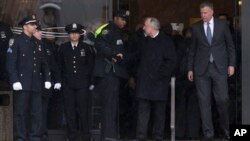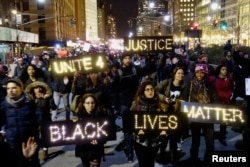Uniformed police from across the United States lined up Saturday in Brooklyn, New York, for the wake of Wenjian Liu, one of two police officers killed in an ambush last month, and some officers saluted the city's mayor and police commissioner when they arrived.
Commissioner William Bratton had asked officers to refrain from political statements at the wake for Liu, as well as at his funeral Sunday.
The killing of Liu and Rafael Ramos on December 20 as they sat in their patrol car has laid bare a deep rift between the city’s police force and the administration of Mayor Bill de Blasio.
The shooter, Ismaaiyl Brinsley, 28, had posted anti-police and anti-government messages on Instagram prior to the killing. He also suggested he wanted to take revenge for the deaths of Michael Brown and Eric Garner, both unarmed black men who died at the hands of white police officers. Brown died in Ferguson, Missouri; Garner died in New York.
De Blasio infuriated some police officers by sympathizing with protesters who took to the streets to demonstrate against Garner’s death.
Last week, hundreds of police attending Ramos’ funeral turned their backs to a giant TV monitor as de Blasio spoke. The New York Times reported Saturday that police union officials had encouraged officers to repeat the show of disapproval at Liu's funeral.
In a memo read in police roll calls Saturday, however, Bratton said "a hero's funeral is about grieving, not grievances."
"I make no threat of discipline," the memo said, but he reminded the officers that "when you don the uniform of this department, you are bound by the tradition, honor and decency that go with it."
The officers’ killings happened at a time of increased tension in New York and around the United States following decisions by grand juries to not indict the police officers involved in the Brown and Garner deaths.
Rita Izsak, the U.N. special rapporteur on minority issues, has called for a review of policing in the United States. She said the grand jury decisions "leave many with legitimate concerns relating to a pattern of impunity when the victims of excessive use of force come from African-American and other minority communities."






